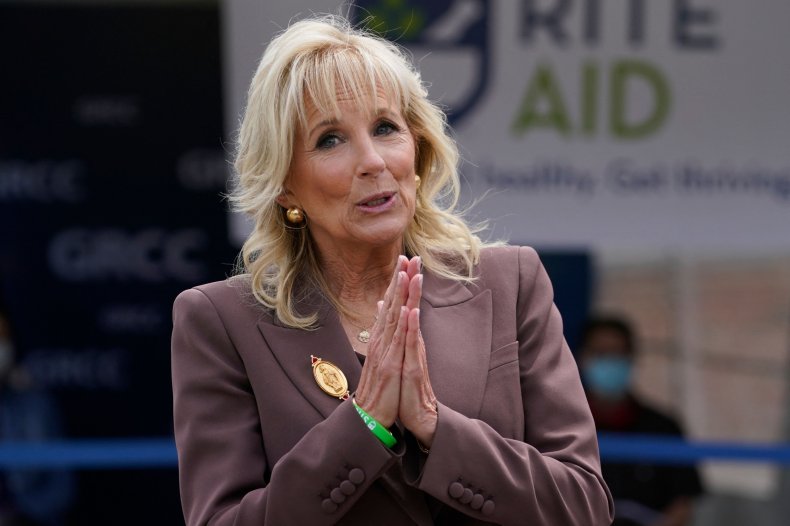First Lady Jill Biden Can Help Teachers | Opinion
Our classrooms are under attack. American teachers have a problem: 26 states—and counting—have introduced bills that either ban critical race theory or limit how teachers can discuss racism and sexism in the classroom. Nine states, thus far, have passed bans.
"The one thing I love about educators is that we all, I think, help one another," said first lady Jill Biden. Right now, first lady, we need your help.
We need federal legislation that guarantees the academic freedom of every American teacher in every American classroom.
Here's why.
Academic freedom preserves the rights of teachers to teach and students to learn uncomfortable truths. On the state-level legislative model (Partisanship Out of Civics Act), developed by Stanley Kurtz, one part of the eighth provision states no teacher should inculcate "any individual" to "feel discomfort, guilt, anguish, or any other form of psychological distress on account of his or her race or sex." Kurtz contends this doesn't bar discussion, but only forbids direct inculcation. But what if mere discussion of historical fact leads to uncomfortable classroom feelings based on race or sex, how will teachers defend themselves?

Following the summer of 1831, on the heels of Nat Turner's rebellion, conservative state legislatures responded with anti-literacy laws. Virginia outlawed teaching reading or writing to any free Black person, 20 lashes the punishment. Georgia and Alabama, in 1833, followed suit. In Georgia, if a teacher was caught teaching Black people to read or write, either a fine or jail, or both followed. While in Alabama, which included spelling too, a teacher would be fined $250 to $500.
Teachers in Alabama and Georgia may no longer connect the current bans on critical race theory to their states' reactionary anti-literacy laws. Even though both came after summers of revolt, and both, like Arizona's, threatened to fine teachers, it doesn't matter. Because this historical truth will make Alabamian and Georgian students feel uncomfortable, Alabamian and Georgian teachers can no longer teach it.
We are in the midst of a teacher shortage crisis. The Economic Policy Institute's final report in their series, "Perfect Storm in the Teacher Labor Market," noted only 30 percent of teachers report feeling they have the power to select instructional materials, topics, or skills to be taught in their classrooms. The authors suggest public policy "ensure[s] that teachers have a say in the curriculum they teach, the classroom practices they follow, and the materials they use." Federal protection of academic freedom does that; state bans do the opposite.
In this past pandemic year, according to "Voices From the Classroom,'' an Educators for Excellence teacher survey, 47 percent of teachers under 30 had classroom conversations on racial injustice and equity. If any of the 47 percent teach under the ban, their classroom conversations on race become legally questionable. Teachers need to feel comfortable leading uncomfortable classroom conversations. They need a new law that respects their professional discretion.
Education in a democracy requires debate and discussion on controversial and divisive issues. Yet Texas, Arizona, Tennessee, Rhode Island, New Hampshire, Ohio, West Virginia, Maine and Arkansas proposed qualifying how and what controversial or divisive issues enter their classrooms. Laws that limit teaching controversial issues break academic consensus.
Certain axiomatic precepts enrich citizenship education. Teachers must be free to think through and discuss controversial issues. Productive disagreement must be seen as both necessary and ideal. Curricula must—to progress and enlighten our understanding of the impact of race in our nation's history—compel us to go beyond grand simplifications and face complicated truths. Law must protect and advance academic freedom.
Teachers in Arizona would've been fined up to $5,000 if they had not properly balanced teaching controversy (the bill, however, did not pass). Teachers in Tennessee now look twice if they dare teach anything other than "impartial" lessons. Teachers in Maine, if the ban passes next legislative session, may not discuss off-topic controversial issues. And, in all of the passed bans, teachers must tread carefully when discussing ugly, racial, albeit uncontroverted, historical truths.
To be sure, I am not calling for unlimited freedom. Some critics of critical race theory have a point. The Foundation Against Intolerance & Racism outlined cases gone too far. Even so, academic freedom protects both dissenters and supporters, prizes heterodoxy over orthodoxy, encourages discomfort and comfort, guarantees due process and entrusts teachers to lead controversial, pro-human, critical classroom conversations.
First lady Jill Biden, teachers need your help. You have the professional credential. You have the political platform. You can ignite a national campaign to draft and pass federalized academic freedom for every American teacher. I, we, us teachers can help—tell us when and where and we will be there.
Max A. Jacobs is a teacher at George Jackson Academy.
The views expressed in this article are the writer's own.


